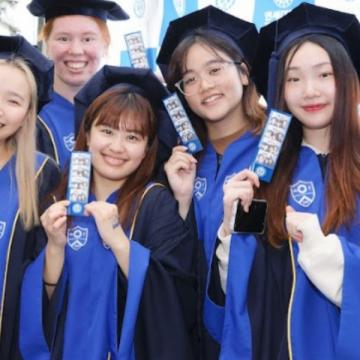
Global Exchange Insider: A Seoul summer at Yonsei University, South Korea
Are you a UBC undergrad thinking about going on a student exchange? It can...
Here’s why the UBC Centre for Migration Studies (CMS) hosted a workshop exploring “Graphic Narratives on Migration” last year—with nine local artists on the power of story, connecting with others and smashing hierarchies: “It’s exciting what can happen when you work across disciplines with new methodology. We thought, why not bring art and research together?” says Dr. Antje Ellermann, CMS Founder and Director, and Department of Political Science Professor.
What’s new: A group of CMS researchers just scored a large federal grant along with three other universities to study migrant integration over the next seven years. The Canada First Research Excellence Fund awarded $98.6 million for a multi-disciplinary collaboration to project lead Toronto Metropolitan University with UBC, the University of Alberta and Concordia University; UBC’s share is $12.4 million. The policy-relevant research program “Bridging Divides” focuses on the challenges and opportunities immigrant integration poses for Canada, both locally and nationally. “Researchers will look at the ways in which Canadian society itself is changing, and how it can respond in ways that advance inclusion and sustainability,” Dr. Ellermann says.
An interdisciplinary team of UBC and Concordia University migration scholars collaborated with Vancouver-based graphic artists on a collection of migration narratives in comics form (video: Sebastian Hill-Esbrand/UBC Centre for Migration Studies)
What do they do: An interdisciplinary and collaborative research unit of the UBC Faculty of Arts, CMS promotes innovative research, graduate training, community and policy outreach on migration and mobility. The centre also hosts a database with immigration statistics. “Our experts delve deeply into issues that affect migration,” says Dr. Ellermann. “Our research and insights help community partners advocate for municipal, provincial and national policies that improve the integration experience for newcomers, and ultimately, forge a more just and thriving society. We believe our strength as a global society lies in making migration successful—for people on the move and the countries that embrace them.”
Why this matters now: Canada’s population just surpassed the 40 million mark. “The country is currently experiencing the highest level of immigration in its history, and immigration is by far the most important driver of demographic and labour force growth,” Dr. Ellermann says. “In 2022, temporary and permanent immigrants accounted for one million net new residents in Canada, which is significant, and the federal government is planning on welcoming nearly 1.5 million newcomers in the next three years. To put that into perspective, one decade ago the immigration levels were about half that.”
“Alongside, we have organizations that support immigrants and refugees facing unprecedented demand for their services. The pandemic has magnified the challenges that immigrants themselves often face: poor working conditions, employment well below their skill level, and social inequities in the form of discrimination and barriers to healthcare. So when it comes to supporting integration, our research findings will certainly be of interest as these organizations determine how best to use their additional resources.”
“The current highs in immigration also coincide with Canada’s ongoing struggle to confront its history of colonization. It is crucial for us to acknowledge the central role of immigration in the colonial context and to consider the role that immigrants can play in the journey towards Truth and Reconciliation.”
What’s next: “We are a young and quickly growing Centre, and the Bridging Divides program is happening very early on in our life span,” Dr. Ellermann notes. “I’m also thrilled about our ongoing recruitment of a President’s Excellence Chair in Global Migration, who will assume the role of Co-Director. The Chair will play a pivotal role in shaping our research agenda and driving our mission forward in the years to come. Together, these developments will contribute to our sustainability in the long run, and will cement UBC’s reputation as a place to study migration.”
Read more about the UBC Centre for Migration Studies.
Listen to the CMS Global Migration Podcast.

Noitargetni
Artist: Nemo Balkanski
Story Group: Language & Integration

To/From
Artist: Kathleen Gros
Story Group: Displacement & Refugees

Belonging
Artist: Alyssa Hirose
Story Group: Community Belonging